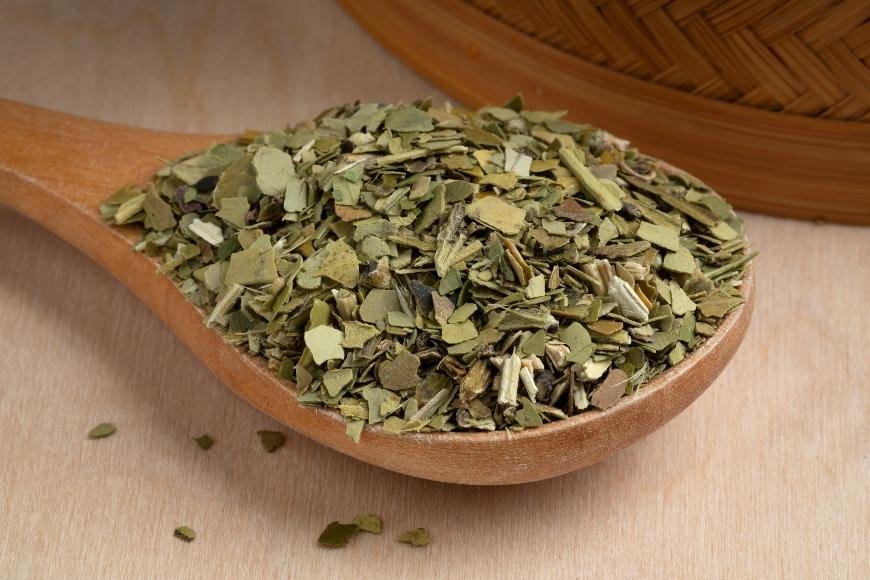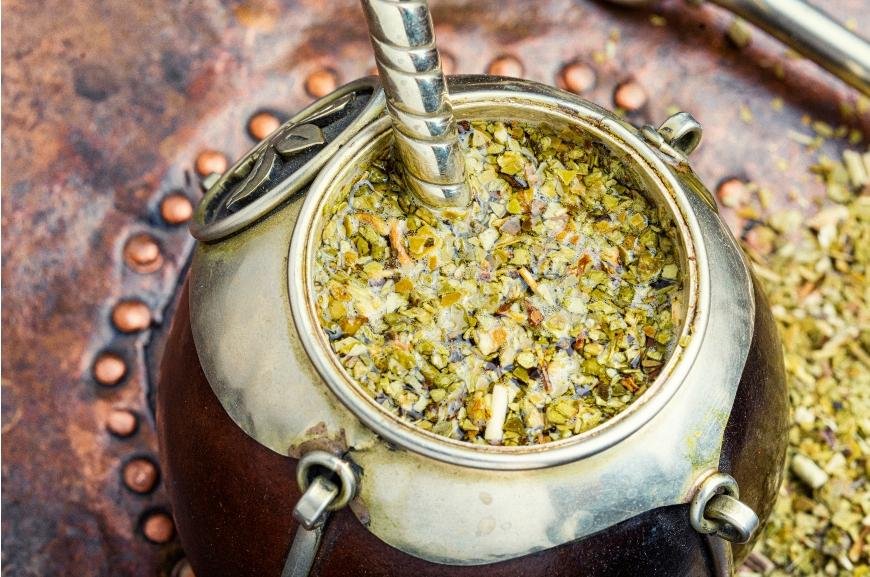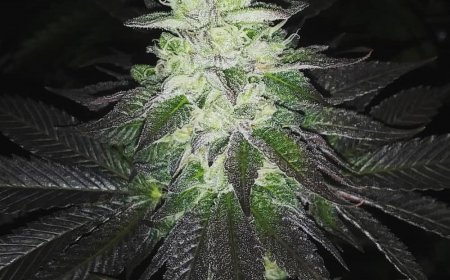How to Use Yerba Maté
Learn how to use yerba maté with our beginner's guide, covering brewing, ceremonies, and health benefits of this popular herbal tea.

If you're interested in discovering the world of yerba maté, this comprehensive guide is a great place to start. Yerba mate has been a staple in South American culture for centuries, and its unique flavor and numerous health benefits have made it increasingly popular worldwide.
In this blog post, we will delve into various aspects of yerba maté consumption. You'll learn about different methods of enjoying this herbal tea - from traditional ceremonies to modern brewing techniques. We'll also discuss proper steeping practices to extract maximum flavor from your yerba mate leaves.
Furthermore, we will examine the potential health benefits associated with drinking yerba mate tea regularly and highlight essential safety considerations when consuming it. By the end of this article, you'll be well-equipped with knowledge on how to use yerba maté effectively and safely as part of your daily routine or special occasions.
Table of Contents:
- What is Yerba Mate?
- Different Methods of Consumption
- Brewing Yerba Mate
- Steeping Yerba Mate
- Preparing a Traditional Yerba Mate Ceremony
- Benefits of Drinking Yerba Mate
- Safety Considerations When Consuming Yerba Mate
- FAQs in Relation to How to Use Yerba Maté
- Conclusion
1. What is Yerba Mate?
Yerba mate, scientifically known as Ilex paraguariensis, is a plant native to South America that has been used for centuries by indigenous people for its stimulating and medicinal properties. The leaves of the yerba mate plant contain natural compounds like caffeine, theobromine, and various antioxidants that can provide both physical and mental benefits when consumed.
The most common way to enjoy yerba mate is by brewing it into a tea-like beverage called mate. This drink has become increasingly popular globally due to its unique taste and potential health advantages. In addition to being enjoyed as a hot or cold beverage, yerba mate can also be found in various forms such as powders, extracts, supplements, and even energy drinks.
- Origin: Yerba mate originates from the subtropical regions of South America - primarily Argentina, Paraguay, Uruguay, and southern Brazil.
- Cultural Significance: Drinking yerba mate plays an essential role in social gatherings among friends and family members in many South American cultures. It's often shared using a traditional gourd called "mate" (pronounced MAH-teh) with a metal straw known as "bombilla."
- Taste Profile: Yerba mate boasts an earthy taste with hints of bitterness balanced by subtle sweetness. Some may find it similar to green tea but with more robust flavors.
Yerba Maté is a traditional South American drink that has been used for centuries to provide energy and improve focus. It's time to explore the different methods of consuming Yerba Maté, so let's take a look at how you can get your daily dose.
Different Methods of Consumption

If you're looking to enjoy the stimulating effects and potential health benefits of yerba mate, there are several ways to consume this versatile plant. The most common methods include brewing it as a tea, steeping it in cold water for a refreshing drink, or even using extracts and supplements.
Brewed Yerba Mate Tea
The traditional way to consume yerba mate is by brewing it into a hot tea. This method allows you to fully experience its unique flavor profile while also reaping its energizing effects. You can brew yerba mate using loose leaves or convenient tea bags, depending on your preference.
Cold Steeped Yerba Mate (Terere)
For those who prefer their beverages chilled, try cold-steeping yerba mate. Terere is popular in Paraguay and other South American countries where temperatures soar during the summer months. To make terere, simply steep the leaves in cold water instead of hot - allowing them to infuse their flavors slowly over time.
Yerberia: A Blend with Other Herbs
In some regions like Argentina and Uruguay, people often mix yerberia - a blend of herbs that includes mint or lemon verbena - with their mate for added taste complexity and potential health benefits such as improved digestion.
Mate Extracts & Supplements
- Mate Concentrate: For those seeking an easy way to incorporate yerba mate into their daily routine, consider using a mate concentrate. This liquid extract can be added to water or juice for a quick energy boost.
- Capsules & Tablets: Yerba mate is also available in capsule and tablet forms. These supplements provide the benefits of the plant without requiring you to brew or steep it. Be sure to follow the recommended dosage instructions on the product label.
Each method of consumption offers its own unique experience, so feel free to experiment and find your favorite way to enjoy this powerful plant. Yerba mate is a great alternative to green tea or herbal tea, and can be enjoyed with hot water or as a tea made with cold water.
Different methods of consumption are important to consider when using yerba maté, as each method can have different effects. To further explore how to use this substance, let's now look at the process of brewing yerba maté.
3. Brewing Yerba Mate
If you're new to the world of yerba mate, brewing it might seem a bit intimidating at first. But fear not. Don't worry - we've got you covered with our simple guide on how to make the perfect cup of yerba mate tea.
Step 1: Gather Your Supplies
To get started, you'll need some high-quality yerba mate leaves, a kettle or pot for boiling water, and either a French press or teapot with an infuser basket for steeping the leaves.
Step 2: Measure Out Your Yerba Mate Leaves
The general rule is to use one tablespoon of loose-leaf yerba mate per eight ounces (240 ml) of water. Feel free to adjust this ratio according to your taste preferences - more leaves will result in a stronger flavor and vice versa.
Step 3: Heat Your Water
You'll want to heat your water just below boiling point - around 185°F (85°C). This temperature ensures that all the beneficial compounds are extracted from the leaves without scalding them and causing bitterness.
Note:
If you prefer a stronger flavor, you can also try using green tea or herbal tea instead of hot water.
Step 4: Steep Your Yerba Mate Leaves
Add your measured-out yerba mate leaves into the French press or infuser basket inside your teapot. Pour over hot water until all the leaves are submerged completely. Let them steep for 3-5 minutes, depending on your desired strength.
Step 5: Strain and Serve
If you're using a French press, simply press down the plunger to separate the leaves from the liquid. If you have an infuser basket in your teapot, carefully remove it without spilling any leaves into your tea. Pour your brewed yerba mate into cups or mugs and enjoy.
Brewing yerba mate is a simple process that allows you to experience its unique flavor profile and potential health benefits. Experiment with different brewing times and leaf-to-water ratios until you find what works best for you. If you're looking for a caffeine boost, try using yerba mate instead of green tea. Cheers.
Brewing Yerba Maté is a simple and enjoyable process that can be enjoyed by all. Now, let's move on to Steeping Yerba Maté for an even more robust flavor experience.
4. Steeping Yerba Mate
If you're looking for a more convenient and quicker way to enjoy yerba mate, steeping is the method for you. This process involves using a tea infuser or teabag filled with loose-leaf yerba mate and hot water to extract its flavors and benefits.
A. Choosing Your Yerba Mate
First things first, pick your favorite yerba mate blend. Various mixtures of yerba mate are accessible, each providing its own unique flavors and qualities. Some popular options include pure leaf varieties, those mixed with herbs like mint or citrus peels, and even roasted versions that provide a smoky flavor profile.
B. Gathering Your Equipment
- Tea Infuser: A reusable stainless steel mesh infuser works best as it allows optimal water flow while keeping the leaves contained.
- Kettle: To heat up your water quickly and efficiently.
- Mug: Choose one that's large enough to hold at least 8 ounces of liquid comfortably.
C. Preparing Your Steeped Yerba Mate Tea

- Filling the Tea Infuser: Measure out about one tablespoon (5 grams) of loose-leaf yerba mate per cup of tea desired into your infuser basket or teabag.
- Pouring Hot Water: Heat fresh cold water in your kettle until it reaches around 160°F -185°F (70°C -85°C). Avoid boiling temperatures as it can cause the tea to become bitter. Pour the hot water over your infuser, filling your mug.
- Steeping Time: Allow the yerba mate to steep for 3-5 minutes, depending on how strong you prefer your tea. The longer it steeps, the more robust and intense its flavor will be.
- Removing Infuser: Once you've reached your desired steeping time, carefully remove the infuser from your mug and set it aside.
Congratulations. You now have a delicious cup of steeped yerba mate ready to enjoy. For added flavor or sweetness, feel free to add honey or lemon slices as desired. Remember that drinking yerba mate in moderation is key due to its caffeine content - so don't go too wild with multiple cups per day.
Steeping Yerba Maté is an important part of the process to make a flavorful cup, so it's essential to understand how long and at what temperature you should steep your tea. Now let's move on to preparing a traditional Yerba Maté ceremony.
5. Preparing a Traditional Yerba Mate Ceremony
In Argentina, Uruguay, Paraguay and Brazil especially, the traditional yerba mate ceremony is an integral part of the culture. This social ritual brings people together to share stories and strengthen bonds while enjoying the stimulating effects of this unique plant. If you're interested in experiencing yerba mate as it has been enjoyed for centuries, follow these steps to prepare your own traditional ceremony:
- Selecting the right equipment: To begin with, you'll need a few key items: a gourd (called "mate" or "cuia"), a bombilla (a metal straw with a filter at one end), and high-quality loose-leaf yerba mate.
- Curing the gourd: Before using your new mate gourd for the first time, it's important to cure it properly. Fill the gourd halfway with dry yerba mate leaves and add hot water until they are completely soaked. Let this mixture sit overnight before emptying out its contents and rinsing thoroughly.
- Filling the gourd: Place about two-thirds full of loose-leaf yerba mate into your cured mate gourd. Tilt it slightly so that most of the leaves gather on one side - this will help create space for water later on.
- Add cold water: Pour some cold water onto the lower portion of leaves inside your tilted mate cup without disturbing their arrangement too much; wait until they absorb all moisture before proceeding further.
- Pouring hot water: Heat up some fresh spring or filtered tap-water just below boiling point (~80°C/175°F) then slowly pour over remaining exposed yerba mate leaves within gourd, making sure not to flood them completely; allow liquid time for steeping into flavorsome tea.
- Insert the bombilla: Once you've allowed your yerba mate mixture to steep for a few minutes, insert the filtered end of your bombilla into the gourd. Be careful not to disturb the arrangement of leaves too much as you do this.
- Serving and sharing: The traditional way is taking turns sipping from the same cup while passing it around the circle of participants - each person should finish the entire contents before refilling with hot water and handing it off to the next individual in line; continue the process until the desired level of stimulation is reached or all have had their fill.
Note that during a traditional ceremony, it's customary for one person (usually the host) to prepare and serve mate throughout the event - this ensures consistency in the flavor experience among guests involved. Enjoy newfound connection with friends and family members alike through shared appreciation of the stimulating properties of yerba mate.
Preparing a traditional Yerba Maté ceremony is an important step in connecting with the plant medicine, allowing one to experience its full potential. Moving on, let's explore the benefits of drinking Yerba Maté and how it can help us achieve our goals.
6. Benefits of Drinking Yerba Mate
Yerba mate is not only a delicious and versatile beverage, but it also offers numerous health benefits that make it an excellent addition to your daily routine. Here are some of the top advantages associated with drinking yerba mate tea regularly:
A. Rich in Antioxidants and Nutrients
Yerba mate contains a high concentration of antioxidants, which can help protect your body against oxidative stress and reduce inflammation. Additionally, this plant boasts an impressive array of essential nutrients such as vitamins A, B1, B2, B3, B5, C & E; minerals like calcium, iron, and magnesium; amino acids; and polyphenols.
B. Boosts Energy Levels and Mental Focus
The caffeine content in yerba mate is similar to that found in coffee or black tea but provides a more balanced energy boost without causing jitters or crashes often experienced with other caffeinated beverages. This makes yerba mate an ideal choice for improving mental focus while providing sustained energy throughout the day.
C. Supports Weight Loss Efforts
Drinking yerba mate may aid weight loss by increasing metabolism rates and helping you feel full longer due to its appetite-suppressing properties (source). Moreover, its thermogenic effects can enhance fat oxidation during exercise sessions.
D. Immune System Support
Yerba mate has been demonstrated to potentially enhance the body's immunity, with its saponins providing a protective layer against potential illnesses. Additionally, its antioxidant properties can further strengthen your body's defenses against illness.
E. Promotes Cardiovascular Health
Yerba mate may be beneficial to heart health, potentially decreasing LDL cholesterol levels and increasing HDL cholesterol levels, thus reducing the risk of cardiovascular diseases. This can lead to a decreased risk of developing cardiovascular diseases such as heart attack or stroke.
Incorporating yerba mate into your daily routine is an excellent way to enjoy these potential health benefits while also experiencing a unique and flavorful beverage tradition from South America.
The health benefits of drinking yerba maté are well-documented, making it a beneficial beverage for those looking to improve their overall wellbeing. As with any substance consumed, however, there are safety considerations that should be taken into account when consuming yerba maté; these will be discussed in the next heading.
7. Safety Considerations When Consuming Yerba Mate
While yerba mate is a popular and widely consumed beverage, it's essential to be aware of potential safety concerns associated with its consumption. In this section, we'll discuss some important factors to consider when enjoying yerba mate tea or other products made from the plant.
Possible Contaminants in Yerba Mate
One concern related to consuming yerba mate is the possibility of contaminants being present in the leaves. Some studies have found traces of pesticides and heavy metals like lead in certain brands of yerba mate (source). To minimize your risk, opt for organic brands that follow strict quality control measures during cultivation and processing.
Caffeine Content
Yerba mate contains caffeine, which can cause side effects such as jitteriness, increased heart rate, and difficulty sleeping if consumed excessively (source). Be mindful of your overall daily caffeine intake from all sources (including coffee, tea, energy drinks) when consuming yerba mate regularly.
- Moderation: As with any caffeinated beverage or substance containing stimulants like xanthines (found in chocolate), it's crucial to consume them moderately. A general guideline would be no more than three servings per day for most individuals.
- Sensitivity: People who are sensitive to caffeine should start by trying smaller amounts before gradually increasing their consumption over time while monitoring how they feel after each serving.
- Timing: Avoid consuming yerba mate late in the evening or close to bedtime, as it may interfere with your sleep quality.
Pregnancy and Breastfeeding
Although there is scant research regarding the safety of yerba mate for expectant mothers and breastfeeding women, it's generally advised to keep caffeine intake low. If you're pregnant or nursing, consult your healthcare provider before consuming yerba mate to determine if it's safe for you.
In conclusion, while enjoying the benefits of yerba mate can be a pleasant experience, being aware of potential safety concerns is essential. By choosing high-quality products and consuming them in moderation according to individual needs and sensitivities, one can safely enjoy this popular South American beverage.
FAQs in Relation to How to Use Yerba Maté
What is the best way to use yerba mate?
The best way to use yerba mate is by brewing it in a traditional gourd or using a French press, teapot, or tea infuser. Steep the leaves for 3-5 minutes and enjoy hot or cold. Experiment with different steeping times and water temperatures to find your preferred taste.
How is yerba mate used?
Yerba mate can be consumed as a hot or cold beverage, traditionally served in a gourd with a metal straw called bombilla. It can also be prepared using modern methods like French presses, teapots, and tea infusers.
Is it OK to drink yerba mate everyday?
Drinking moderate amounts of yerba mate daily (up to three cups) is generally considered safe for most people. However, excessive consumption may lead to negative side effects such as insomnia and increased heart rate due to its caffeine content.
How do you take yerba mate to work?
To take yerba mate on-the-go, prepare it at home using your preferred method (gourd/French press/teapot), then transfer the brewed beverage into an insulated travel mug that will keep it warm throughout the day. Alternatively, bring pre-packaged bags of loose leaf mate along with an infuser for easy preparation at work.
Conclusion
Yerba Mate is a popular South American drink that can be consumed in various ways, such as brewing or steeping. It can also be enjoyed through a traditional ceremony. Drinking Yerba Mate has many benefits, but it's important to consider safety precautions before consuming it.
Yerba Mate, also known as Yerba Mate, is made from the leaves of the Yerba Mate plant. It's often compared to green tea or herbal tea, but it has a unique flavor and aroma that sets it apart. To make Yerba Mate tea, you'll need hot water and Yerba Mate leaves. You can also add sweeteners or milk to taste.
One of the benefits of drinking Yerba Mate is that it contains caffeine, which can help boost energy levels and improve mental focus. It also contains antioxidants, which can help protect against cell damage and reduce the risk of chronic diseases.
When preparing Yerba Mate, it's important to use hot, but not boiling water. Boiling water can make the tea taste bitter. You can also use a Yerba Mate gourd and bombilla, which is a traditional way of drinking Yerba Mate. The gourd is filled with Yerba Mate leaves, and the bombilla is used to filter the tea as you drink it.
In conclusion, Yerba Mate is a unique and flavorful beverage with many health benefits. Whether you prefer to drink it hot or cold, with or without sweeteners, Yerba Mate is a great alternative to traditional teas. So why not give it a try and see what all the fuss is about?





































































































































